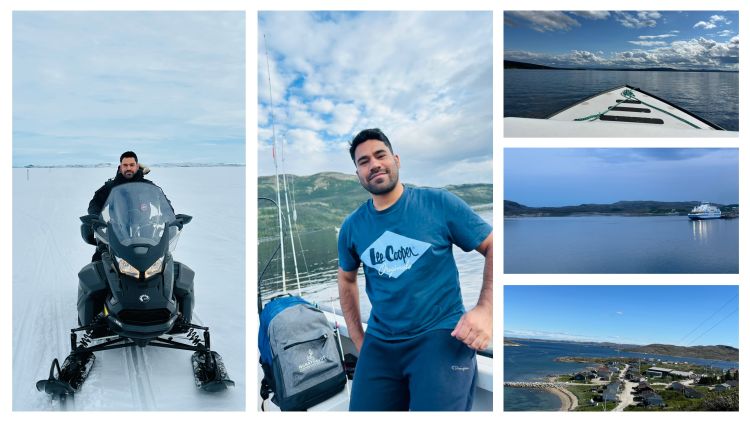Collaborating with Indigenous communities affected by climate change

Dr Ishfaq Malik’s collaborative, community-based research explores climate change in communities in the Arctic and the Himalayas – whose experiences of environmental disruption are often missing from global climate discussions.
Dr Malik works at the intersections of climate change, Indigenous knowledge systems, and decolonial environmental politics. He discusses how power, history, and knowledge shape human and environment relations. In close collaboration with Indigenous community members, he reveals how structural inequalities, colonialism, capitalism, and environmental governance shape who is most impacted by the climate crisis.
Indigenous knowledge in the Arctic
The Arctic is one of the most impacted areas of the globe by the climate crisis, warming more rapidly than any other region. Ice loss, sea warming, and wildfires mean that wildlife is in decline, while communities are facing food shortages, disrupted travel routes, and increasing industrial activity.
In the Arctic Canada, climate change strongly affects Inuit ways of life, food security, and cultural identity. Dr Malik works with Inuit communities in the Canadian Arctic to document Indigenous knowledge, experiences of climate change, and adaptation strategies.
Dr Malik says: “What I love most about research is the relationships—building trust, learning from lived experience, and co-producing knowledge that is not just about communities, but with them and for them.”
Growing up in the Himalayan region of Kashmir, I witnessed firsthand how climate change, marginalisation, and inequality intersect to shape everyday lives.
Climate change impact in Kashmir
Understanding climate change impact and adaptation in marginalised communities is a personal project for Dr Malik. He says: “Growing up in the Himalayan region of Kashmir, I witnessed firsthand how climate change, marginalisation, and inequality intersect to shape everyday lives.
“This lived experience led me to study the socio-political dimensions of climate change, particularly how vulnerability and resilience are structured by history, governance, and power. My academic and personal journey has been deeply shaped by questions of justice, marginalisation, and environmental change.”
Dr Malik now researches and documents the structural inequalities in the region he grew up in. He focuses on the socio-political dimensions of climate change and disasters in Kashmir. His research has found that climate change disproportionately impacts women, pastoralists, and rural households. Working with these communities has exposed how class, gender, and mobility shape both vulnerability and response. Their collaborative research points toward the need for more equitable infrastructure, participatory planning, and social protections.
I’m driven by the urgent need to decolonise climate research and amplify the voices of those who have long been excluded from shaping climate solutions—especially Indigenous and marginalised communities.
Decolonising climate research
Dr Malik’s research sheds light on how climate change is not only a natural crisis, but a political and economic one, entangled with the histories of colonialism, structural inequality, and capitalist development. He says: “I’m driven by the urgent need to decolonise climate research and amplify the voices of those who have long been excluded from shaping climate solutions—especially Indigenous and marginalised communities.
“What sets my work apart is its commitment to ethical, community-led, and decolonial approaches to climate research. I chose Leeds not just for its academic excellence, but because it supports the kind of grounded, justice-oriented research that I believe climate science urgently needs. Leeds offered the ideal intellectual environment and mentorship, particularly from Professor James Ford.”
Dr Malik highlights the root causes of the climate crisis, while empowering marginalised communities to share their experiences, knowledge, and stories: “I hope my work helps reshape how we think about adaptation—not just as a response to risk, but as a political, cultural, and ethical process grounded in justice, history, and hope.”
About Dr Ishfaq Malik
Dr Malik is a Postdoctoral Research Fellow at the School of Geography, University of Leeds.
His research is rooted in political ecology and engages critically with the uneven geographies of climate change, adaptation, and resilience.
Dr Malik has published several research papers exploring climate change impacts, vulnerability, and adaptation through community-based and political ecology frameworks. Some of these works include:
- Understanding the Impacts of Arctic Climate Change Through the Lens of Political Ecology
- Monitoring climate change vulnerability in the Himalayas
- Barriers and limits to adaptation in the Arctic
- Can political ecology be decolonised? A dialogue with Paul Robbins
- Climate change, mass casualty incidents, and emergency response in the Arctic
- Monitoring climate change impacts, Indigenous livelihoods, and adaptation: Perspectives from Inuit community of Hopedale, Nunatsiavut, Canada (Co-authored with Indigenous community members).
His research is funded by UK Research and Innovation (UKRI), NERC Arctic office, and the European Research Council (ERC).

